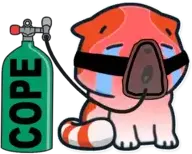This was an essay I wrote some years back, when I used to be a deeply devout communist and MLM-TW. This marked the beginning of my reading into Italian Left Communism, and straying into eclecticism before eventually abandoning communism outright. I had initially shared this essay internally with other LSC mods, who refused to acknowledge it. I then posted it publicly to multiple communist subreddits, even lefty pol. It was censored in all but one of them. In that last one, not a single person was able to provide a substantive reply, and all comments were variations of trite deflections.
I'm going to give the background that builds up to my question, and what I am contending is if Stalin was wrong in Economic Problems of the USSR. It's a bit lengthy, but please help me out here.
Background:
This all stems from a blog post I found that goes over Karl Marx's conceptualization of the DotP and lower-higher phase communism. It's a bit long but I recommend a read as it's more thorough than my following shorter (but still somewhat long) summary of it.
This blog concludes that DotP and socialism are not the same, and socialism itself is not a transition period between capitalism and communism. Rather, the DotP is the transition period between capitalism and socialism. Socialism wouldn’t have a DotP because it’s a lower phase of communism where classes would cease to exist, and the only remnant of the state that is left would be a “bourgeois state without a bourgeoisie” to protect what is called bourgeois right. Socialism, like communism, is classless and moneyless, and only differs on the fact that in full communism, there is a “communism” of distribution as well as production, i.e. all people work to their true ability and receive based on their need.
Marx backs up ALL of this in Gothakritik. Here is the textual evidence.
Dictatorship of the Proletariat is NOT the same as socialism – In Critique of the Gotha Programme, Marx said:
Between capitalist and communist society there lies the period of the revolutionary transformation of the one into the other. Corresponding to this is also a political transition period in which the state can be nothing but the revolutionary dictatorship of the proletariat.
It's common knowledge that Marx used socialism and communism interchangeably; that Lenin is the one who draws a clear distinction between socialism and communism, the former being the lower phase of the latter. But for argument’s sake, let's pretend that Marx was really referring to socialism as a transition between capitalism and communism. Why would this be untrue?
If political aspect of this transition is the Dictatorship of the Proletariat, then what is the economic aspect?
First, understand that capitalism - as the blog succinctly puts - is:
…generalized commodity production where labor power itself has become a commodity. …those who operate the means of production…don’t own them. Instead, a separate class of people…own the means of production. The capitalists purchase labor power from…people who own neither land nor capital. The proletarians sell their ability to work, or labor power, to the capitalists and get in return a definite sum of money—called a wage. Wages are therefore nothing but the price of labor power.
(If anyone takes issue with this definition of capitalism from a Marxist POV, then please feel free to say why)
Second, understand that socialism would have no commodity production. Marx says in Gothakritik:
Within the co-operative society based on common ownership of the means of production, the producers do not exchange their products; just as little does the labor employed on the products appear here as the value of these products, as a material quality possessed by them, since now, in contrast to capitalist society, individual labor no longer exists in an indirect fashion but directly as a component part of total labor. The phrase "proceeds of labor", objectionable also today on account of its ambiguity, thus loses all meaning.
If private ownership of the Means of Production is wholly replaced by common ownership, then surely there can be no classes. In terms of ownership, all people are equal. Note that Marx essentially says commodity production is non-existent in socialism as well.
But how do we know Marx is referring to socialism (lower phase) and not communism (higher phase)?
Next paragraph:
What we have to deal with here is a communist society, not as it has developed on its own foundations, but, on the contrary, just as it emerges from capitalist society; which is thus in every respect, economically, morally, and intellectually, still stamped with the birthmarks of the old society from whose womb it emerges. Accordingly, the individual producer receives back from society– after the deductions have been made – exactly what he gives to it. What he has given to it is his individual quantum of labor. For example, the social working day consists of the sum of the individual hours of work; the individual labor time of the individual producer is the part of the social working day contributed by him, his share in it. He receives a certificate from society that he has furnished such-and-such an amount of labor (after deducting his labor for the common funds); and with this certificate, he draws from the social stock of means of consumption as much as the same amount of labor cost. The same amount of labor which he has given to society in one form, he receives back in another.
First sentence - Marx is referring to communist society that has immediately birthed from the fall of capitalism, which can only be socialism (lower phase). More important to note is that in this paragraph, Marx elucidates that money would not exist in socialism, carefully using the word “certificates” as opposed to “money”, and this is reinforced by the fact that Marx said commodity production wouldn’t exist. Money is a special commodity whose use value is what the value of all other commodities are measured by, according to the author. Token money represents a definite quantity of a money commodity.
Let’s get this straight so far
Socialism has: no money and no classes. No classes mean no class struggle either... ...and since the Dictatorship of the Proletariat is obviously predicated on a proletariat existing, it must precede a social stage in which that is not the case.
Therefor the Dictatorship of the Proletariat is its own stage. Or more specifically – the transition stage between capitalism and socialism.
Back to the original question: What is the economic side of the dictatorship of the proletariat? Clearly, it’s not socialism. So does that mean it’s capitalism?
Circle back to the first quote by Marx:
Between capitalist and communist society there lies the period of the revolutionary transformation of the one into the other. Corresponding to this is also a political transition period in which the state can be nothing but the revolutionary dictatorship of the proletariat.
Pay attention to the syntax first. The first sentence speaks of a transition between two ECONOMIC modes of production, THEN the second sentence speaks of a POLITICAL transition. We can infer then that the first sentence is speaking of an economic transition. This economic transition is a clash between capitalism and socialism, where both relations of production exist in contradiction to each other. There is no word for this economic transition stage that Marx uses, and interestingly I realized that the Maoists have this exact same conception of the modes of production and transition stages, they merely just moved the words socialism and communism back one place. To the Maoists: socialism refers to this nameless economic transition. Communism refers to both the lower and higher stages of communism.
A linguistic failure on both the part of Marx and Maoists, the former doesn’t have a word for the economic transition, and the latter doesn’t have a word to differentiate the lower and higher phases.
We have answered the original question and have successfully differentiated the Dictatorship of the Proletariat and socialism. Now let’s stick to this terminology that was presented in the first place for the sake of understanding: Nameless economic transition Dictatorship of the Proletariat is a political transition Socialism is lower phase of communism Communism is shorthand for the higher phase of communism.
The next question arises:
What is the difference between socialism (lower phase) and communism (higher phase)?
To reiterate, we already know that socialism features complete common ownership of the Means of Production, no class system, and no money. At first glance that’s pretty darn similar to full communism, and of course we have seen that Marx says wage labor and commodity production do not exist either. So what’s left to differentiate the two?
This is a long quotation by Marx but it answers it completely. Skip to the bottom for the English version:
What we have to deal with here is a communist society, not as it has developed on its own foundations, but, on the contrary, just as it emerges from capitalist society; which is thus in every respect, economically, morally, and intellectually, still stamped with the birthmarks of the old society from whose womb it emerges. Accordingly, the individual producer receives back from society – after the deductions have been made – exactly what he gives to it. What he has given to it is his individual quantum of labor. For example, the social working day consists of the sum of the individual hours of work; the individual labor time of the individual producer is the part of the social working day contributed by him, his share in it. He receives a certificate from society that he has furnished such-and-such an amount of labor (after deducting his labor for the common funds); and with this certificate, he draws from the social stock of means of consumption as much as the same amount of labor cost. The same amount of labor which he has given to society in one form, he receives back in another.
Here, obviously, the same principle prevails as that which regulates the exchange of commodities, as far as this is exchange of equal values. Content and form are changed, because under the altered circumstances no one can give anything except his labor, and because, on the other hand, nothing can pass to the ownership of individuals, except individual means of consumption. But as far as the distribution of the latter among the individual producers is concerned, the same principle prevails as in the exchange of commodity equivalents: a given amount of labor in one form is exchanged for an equal amount of labor in another form. Hence, equal right here is still in principle – bourgeois right, although principle and practice are no longer at loggerheads, while the exchange of equivalents in commodity exchange exists only on the average and not in the individual case.
In spite of this advance, this equal right is still constantly stigmatized by a bourgeois limitation. The right of the producers is proportional to the labor they supply; the equality consists in the fact that measurement is made with an equal standard, labor.
But one man is superior to another physically, or mentally, and supplies more labor in the same time, or can labor for a longer time; and labor, to serve as a measure, must be defined by its duration or intensity, otherwise it ceases to be a standard of measurement. This equal right is an unequal right for unequal labor. It recognizes no class differences, because everyone is only a worker like everyone else; but it tacitly recognizes unequal individual endowment, and thus productive capacity, as a natural privilege. It is, therefore, a right of inequality, in its content, like every right. Right, by its very nature, can consist only in the application of an equal standard; but unequal individuals (and they would not be different individuals if they were not unequal) are measurable only by an equal standard insofar as they are brought under an equal point of view, are taken from one definite side only – for instance, in the present case, are regarded only as workers and nothing more is seen in them, everything else being ignored. Further, one worker is married, another is not; one has more children than another, and so on and so forth. Thus, with an equal performance of labor, and hence an equal in the social consumption fund, one will in fact receive more than another, one will be richer than another, and so on. To avoid all these defects, right, instead of being equal, would have to be unequal. But these defects are inevitable in the first phase of communist society as it is when it has just emerged after prolonged birth pangs from capitalist society. Right can never be higher than the economic structure of society and its cultural development conditioned thereby.
In a higher phase of communist society, after the enslaving subordination of the individual to the division of labor, and therewith also the antithesis between mental and physical labor, has vanished; after labor has become not only a means of life but life's prime want; after the productive forces have also increased with the all-around development of the individual, and all the springs of co-operative wealth flow more abundantly – only then can the narrow horizon of bourgeois right be crossed in its entirety and society inscribe on its banners: From each according to his ability, to each according to his needs!
if you skipped, here is a simpler interpretation:
Marx says that socialist society is “stamped” by the capitalist past. He also says that under socialism workers earn according to their labor, not to their needs. A ‘ghost’ principle of capitalism remains. “a given amount of labor in one form is exchanged for an equal amount of labor in another form.” This exchange is facilitated by what Marx calls certificates, not money.
This can be summed up very quickly – under socialism, there is a communism of the Means of Production, but not of the Means of Distribution.
A communism of the Means of Distribution would look like collective distribution of products/services based on need, not labor. Under socialism, this is not the case. Rather, something that Marx called “bourgeois right” – the same system that exist under wage labor. This is a “defect” in the lower phase of communism.
Moreover, Marx says that another defect in socialism is the “enslaving subordination of the individual to the division of labor.” From this flows the “antithesis between mental and physical labor.” As a result of the survival of the “enslaving division of labor,” labor is most certainly not “life’s prime want.” What prevents the abolition of the division of labor is insufficiently developed productive forces. Marx explained that right can never be higher than the level of economic development. Not all individuals under socialism will be able to work according to their true ability. Only the privileged will be able to, and this will be the case until the distinction between mental and physical labor dissipated, and the division of labor is abolished – the success of which marks the transition into full communism.
To further define socialism, if we have “bourgeois right” governing distribution, yet socialism is classless, what happens to the state? Marx was very hostile to any notion that the state could be a state of the “whole people” because if it does then it should dissipate – the state is an instrument of class domination and becomes useless without classes. Lenin provides an explanation, claiming the state during socialism is a “bourgeois state without the bourgeoisie”. The state would exist minimally, likely insofar as a court system to settle disputes over the amount of work that one has contributed and their right to take goods from the “common stores.” There would also have to be an institution that enforces laws against shoplifting by people who want to get more goods than what they are entitled to based on the amount of labor performed. This implies that petty crime would still exist under socialism as well.
So what distinguishes socialism from communism is that socialism has bourgeois right over distribution, has a “state” of sorts or an analogue of it, has division of labor and a distinction between mental and physical labor, and will still contain a privilege where only some people can work according their true ability (though as socialism grows closer to communism, so will the amount of people with this ‘privilege’).
In communism, everyone gets be an intellectual. Agriculture will simply become another branch of industry (this is already slowly being the case as in the current time in the first world, agriculture involves more and more technology and first world farmers have little resemblance to farmers 100 years ago). Everyone can draw from “common stores” of goods according to their needs Everyone can contribute according to their true abilities and labor becomes life’s primary want.
The Question:
Lenin apparently reinforced everything Marx said in Gothakritik. Here is one important quote from Economics And Politics In The Era Of The Dictatorship Of The Proletariat:
Socialism means the abolition of classes. The dictatorship of the proletariat has done all it could to abolish classes. But classes cannot be abolished at one stroke.
And classes still remain and will remain in the era of the dictatorship of the proletariat. The dictatorship will become unnecessary when classes disappear. Without the dictatorship of the proletariat they will not disappear.
Now here is when it gets dicey with Stalin and Economic Problems of the USSR. He claims that the Soviet Union has actually become socialist - by Lenin's own definition. That means Stalin is saying that the Soviet Union has surpassed the Dictatorship of the Proletariat into the lower phase of communism and become a classless society. Here are the relevant quotes.
It is sometimes asked whether the law of value exists and operates in our country, under the socialist system.
Yes, it does exist and does operate. Wherever commodities and commodity production exist, there the law of value must also exist.
How is this possible when Marx explains that commodity production does not exist under lower phase communism?
Undoubtedly, with the abolition of capitalism and the exploiting system in our country, and with the consolidation of the socialist system, the antagonism of interests between town and country, between industry and agriculture, was also bound to disappear.
All this means that the ground for the antithesis between town and country, between industry and agriculture, has already been eliminated by our present socialist system.
How is this possible when Marx explains the abolition of division of labor happens in higher phase communism?
We have a similar situation as regards the problem of the abolition of the antithesis between mental and physical labour.
...it really has disappeared in our present socialist system. Today, the physical workers and the managerial personnel are not enemies, but comrades and friends, members of a single collective body of producers who are vitally interested in the progress and improvement of production.








Jump in the discussion.
No email address required.
i'm not reading that shit, good luck tho
Jump in the discussion.
No email address required.
It's literally a 20 paragraph rhetorical question
Jump in the discussion.
No email address required.
It was written by a (then) communist, 5 words is too many
Jump in the discussion.
No email address required.
More options
Context
More options
Context
More options
Context
Jump in the discussion.
No email address required.
More options
Context
I MEANT TO POST THIS TO /h/THE_PIZZA_BOYS AHHHHHHHHHHHHHHHHHHHHHHHHHHHHHHHHHHHHHHHHHHHHHHHHHHHHHHHHHHHHHHHHHHHHHHHHHH
Jump in the discussion.
No email address required.
Accidentally put it in the wrong hole?
Jump in the discussion.
No email address required.
More options
Context
More options
Context
Imagine not having figured out that being an ideologue is an incredibly lazy and juvenile way to view the world before you get into high school. Stopped reading here.
I don't know what MLM-TW is, sounds like it's probably a pyramid scheme. Do you use the ranks like "diamond" and "double diamond" that all the other Amway splinters have?
Jump in the discussion.
No email address required.
Marxist-Leninist-Maoist Third Worldist. He basically believes white people are too comfy for revolution so only POC can have one now.
Jump in the discussion.
No email address required.
More options
Context
More options
Context
Yes
Jump in the discussion.
No email address required.
More options
Context
Jump in the discussion.
No email address required.
More options
Context
Marx never specified what an actual transition would look like because Hegelian Dialectics has the concept of the geist which effectively describes a mode of thought which through which society would figure it out and everything would naturally flow from that.
For Marx, when the proletariat seized the means of production, communism would arise as the society worked collectively because the cause of social conflict (and really human history as a whole for him) was the separation from the people from the means of production via a system of capital.
Lenin found out (as all those who usurp governments do) that a base of power via a centralozsd organization is necessary to enact massive, sweeping change in a short period of time. Therefore, this became the rationalization of the need for a DotP during the transition to communism.
I think you're getting too hung up on "socialism vs communism" distinction.
Jump in the discussion.
No email address required.
I don't disagree with the argument, and Marx does not say anything about the transition that is true. But he does give a framework of what would appear to happen AFTER the transition, including the development of lower phase communism (what we call socialism) into higher phase communism (communism proper). Why this is important is because after Lenin, virtually every communist leader and theorist had magicked their own ideas of what this would look like, independent from and contradictory to Marxism. Each had their own unique take, which eventually contributed to widespread petty sectarianism that ultimately over a disagreement on what socialism and communism really are. Nearly all leftist infighting is predicated on these refusing to acknowledge that many communists were just plain wrong or even dangerously stupid in their analysis.
Lenin was a radical thinker, but he prided himself in his comprehension of orthodox Marxism. You can see how Lenin was able to extrapolate this conclusion from Marx, specifically in Gothakritik. What Lenin did was elaborate with great detail upon the political where Marx had left more to be desired. The concept of the DotP is one such case, and while Lenin emphasized its importance, and with it the importance of iron-fisted rule through democratic centralism, the Vanguard party, state repressions, this was not novel.
Jump in the discussion.
No email address required.
More options
Context
That's because Marx's ideal goal was Proudhon-esque anarchism. The "stateless classless society" part gives it away.
Jump in the discussion.
No email address required.
r-slur alert
Jump in the discussion.
No email address required.
"r-slur alert" says the guy who never gave a shit about his namesake until he heard that Joker was a spiritual remake of it.
Jump in the discussion.
No email address required.
Didn't read lol
Jump in the discussion.
No email address required.
checks out lol
Jump in the discussion.
No email address required.
More options
Context
More options
Context
More options
Context
More options
Context
More options
Context
More options
Context
marxist-leninist-maoist - transwoman?
Jump in the discussion.
No email address required.
Close! Marxist-Leninist-Maoist - Third Worldist. Just as neurodivergent.
Jump in the discussion.
No email address required.
More options
Context
More options
Context
I'm not answering your multi-paragraph rhetorical question.
Jump in the discussion.
No email address required.
More options
Context
What turned you into a greedy capitalist
Jump in the discussion.
No email address required.
I locked myself in a 600 sq ft apartment and didn't interact with anyone for a year. Started taking iodine, drank RO'd filtered water, tried removing myself from all distractions including electronics so I had no smartphone. I would just wake up, eat raw oat meal, stare at a wall, take a shit, then stare at a wall some more, then go to bed. Wake up and do it all over again.
Jump in the discussion.
No email address required.
least deranged lsc janny
Jump in the discussion.
No email address required.
More options
Context
You could have just gone to prison for a while instead
Jump in the discussion.
No email address required.
How can he deprogram from communism if he makes society pay for him?
Jump in the discussion.
No email address required.
More options
Context
More options
Context
Jump in the discussion.
No email address required.
More options
Context
Is that a real answer???
Jump in the discussion.
No email address required.
There is a lot more to it, and I'm about to go to bed. But yes, this was a big part of it. As weird as this may sound, the rest would probably sound even more nonsensical (and possibly gay).
Reversing communist brainwashing is a serious endeavor!
Jump in the discussion.
No email address required.
I’m starting to think the schizo meme might not be a meme for some of you guys
Jump in the discussion.
No email address required.
More options
Context
More options
Context
More options
Context
More options
Context
zoz
Jump in the discussion.
No email address required.
zle
Jump in the discussion.
No email address required.
zozzle
Jump in the discussion.
No email address required.
More options
Context
More options
Context
More options
Context
More options
Context
Text limit reached
(2/2)
Can Stalin really make such a bold claim that mental and physical labor distinction was eliminated?
And lastly this short bit.
Stalin affirms earlier that the USSR is socialist, and then that socialism has eliminated antagonistic class contradictions, which follows Lenin's assessment that socialism is classless.
How can anyone argue that the USSR was classless?
I can't help but believe that Stalin has made a serious political error in his analysis which has colored all ML(M)s to this day. If we go by Marx and Lenin, lower phase communism was never achieved, and the Dictatorship of the Proletariat was never surpassed. Socialism, as Lenin defined it, was never even seen.
I would very heavily appreciate the thoughts and analysis of everyone that reads this.
My questions are on if Stalin was wrong in Economic Problems of the USSR and if the blog's analysis of Marx in Gothakritik is wrong, And if the latter is so, what does Dictatorship of the Proletariat, socialism, and communism actually entail?
Jump in the discussion.
No email address required.
You wrote 20 paragraphs of text over not understanding that a German book from the 1850s and a Russian book from the 1950s use words differently when translated to English?
Jump in the discussion.
No email address required.
It's deeper than that!!! I swear!!!!!
Jump in the discussion.
No email address required.
More options
Context
More options
Context
i wouldn't call it a "political error"
stalin likely was just dishonest (+ slightly r-slurred?) and wrote that as a cope+propaganda
Jump in the discussion.
No email address required.
More options
Context
In retrospect, one could use this analysis to support the idea that China may indeed have the most accurate and modernized assessment on Marxism, and that China is not socialist, but is on the path to socialism in an economic transition stage, and that perhaps they are also in a political transition stage as a Dictatorship of the Proletariat. Considering even China claims that they are not socialist, and can only hope to achieve it by the year 2036 (might be off by a couple decades), this would consistent with this analysis - which is similar to the Italian Leftcom analysis as well.
In other words, the "right" branch of Marxism, the successors of Marx and Lenin, and the branch of Marxism that has the most realistic and non-ideological view of the world are the modern Chinese communists and the Italian Leftcoms (Bordigists).
This would also mean disavowing the Soviet Union and the Cultural Revolution - alongside virtually every other socialist/communist state - as complete and abject failures.
Jump in the discussion.
No email address required.
More options
Context
More options
Context
Jump in the discussion.
No email address required.
More options
Context
Maybe
Jump in the discussion.
No email address required.
More options
Context
Not gonna write explaining how DotP is or isn't socialism on rdrama. Just watch a FinnishBolshevic video
explaining how DotP is or isn't socialism on rdrama. Just watch a FinnishBolshevic video
Jump in the discussion.
No email address required.
Who is faking being a finn, but is also a libertarian.
Jump in the discussion.
No email address required.
did you see him at a NAMBLA meeting?
Jump in the discussion.
No email address required.
There is ancient rdrama drama about some dramanaut lurking in his groomercord and finding him asking nudes from teen girls.
BTW he is also based in Estonia and is a westerner (as I said pretending to be Finn) - you might wanna Google age of consent in Estonia to understand why he lives(lived) there.
Jump in the discussion.
No email address required.
That's fair I guess, I've called people libertarians for less . I don't think that detracts from the content of his videos, even if he should be treated like a pinata.
. I don't think that detracts from the content of his videos, even if he should be treated like a pinata.
Jump in the discussion.
No email address required.
His vids are as legit as PragerU content.
His sources make Black book of communism look decently legitimate
Jump in the discussion.
No email address required.
More options
Context
More options
Context
More options
Context
More options
Context
More options
Context
More options
Context
Idk the new economic plan was based and deng was right
Jump in the discussion.
No email address required.
More options
Context
Mucho texto hombre
Jump in the discussion.
No email address required.
More options
Context
capitalism is the end of history, we figured this out in the 90s
Jump in the discussion.
No email address required.
More options
Context
Darn that sucks (or congratz idk)
Jump in the discussion.
No email address required.
More options
Context
Go post this on Hexbear if you want the satisfaction of knowing people will read this shit. Even better they will be salty about it and start debate broing you.
Jump in the discussion.
No email address required.
More options
Context
Stalin made political error in not killing more actual communists and socialists
And unironic answer - yes, multiple. The simplest one after the obvious too much bloodshed also some countries never needed to be a part of USSR if nothing else for the future stability of the state. The bastard just got too paranoid and too greedy. Party also did an error by not offing him in like 1948.
Jump in the discussion.
No email address required.
More options
Context
Words words words.
1840s shit is irrelevant and outdated.
Jump in the discussion.
No email address required.
More options
Context
Being a racist loser that makes fun of racist losers doesn't make you any less of a racist loser. Pretending you're too stupid to understand how you spend your free time doesn't make it any less pathetic to spend your free time that way.
Jump in the discussion.
No email address required.
More options
Context
I can't remember exactly, Either 2017 or 2018
Jump in the discussion.
No email address required.
That's because /leftypol/ exists as nothing more than a /pol/ boogeyman. Most left-wing channers never gave a shit about g*mergate beyond le funny drama and thus had no reason to go offsite to 8chan.
Jump in the discussion.
No email address required.
More options
Context
More options
Context